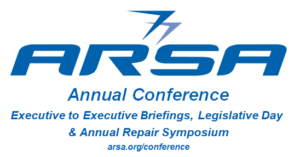2019 – Edition 3 – April 5
Table of Contents
Note: The order of material varies in hotline emails, but is always presented the same on this landing page. Readers scrolling through content on or printing this page will find it organized consistent with the table of contents.
President’s Report
2019 Annual Conference
ARSA Works
Legal Brief
ARSA on the Hill
Regulatory Update
Training
Membership
Resources
Industry Calendar
State of the Association
President’s Report
By David Latimer, Senior Vice President of Regulatory Compliance and ARSA’s 2019 President
Editor’s Note: ARSA President David Latimer delivered his “state of the association” address during ARSA’s annual membership meeting and breakfast, held on March 15 during the 2019 Annual Conference. The following is the text of Mr. Latimer’s prepared remarks, annotated with links to resources and information about activities as described in the text:
Good morning. This Annual Meeting of the Members of the Aeronautical Repair Station Association will come to order.
You’ve made it to the final day of ARSA’s 2019 Annual Conference. When the team made the decision last year to re-brand this expansive week of meetings, discussion sessions, panel presentations and professional networking into the singular “Conference,” careful planning was made to ensure minimal panic ensued should anyone think there would be no “Symposium” this year. As you can see having experienced it, the symposium’s regulatory and business content remains the cornerstone of this event’s value…having grown to include proactive, personal engagement with Congress as well as federal executive agencies.
I’m David Latimer, senior vice president of regulatory compliance for HAECO Americas. I’ve been a member of ARSA’s Board of Directors since 2004, have served the association in a number of different roles and stand before you in the middle of my second term as its president.
Should you need proof of my credentials, look no further than our own Sarah MacLeod. In the press release announcing my election last fall – I sure hope you saw it because that means you’re receiving ARSA’s communications – the association’s venerable executive director said…and I quote:
“David is the perfect example of what a committed aviation maintenance professional can achieve.”
I share that not to brag on the kind words, but because of the point Sarah went on to make. Noting I was a technician turning wrenches long before I became a leader planning organizational strategy, she said my presidency would provide a means to celebrate the upward mobility available to highly-skilled individuals in this industry. I couldn’t be more enthusiastic about this mission, since we all know both the value of the careers available in maintenance and the desperate need we have to find and keep skilled technicians.
As I provide the report on the state of the association, I urge you to keep this focus in mind. Consider how everything ARSA does supports the growth of the industry, makes it valuable to the world and improves the environment in which we work.
Of course, I’ll begin by introducing the people with whom I work most closely for ARSA, my colleagues on the board of directors. Each of them brings unique insight to the board’s work and ensures the association’s voice represents and reaches every corner of the industry.
Alright guys, it’s time: Please stand when I call your name and remain standing until all are named.
ARSA’s Vice President Ian Cheyne from BBA’s Dallas Airmotive. Ian represents engine maintenance providers and was first elected to the board in 2002.
Ian is joined on the executive committee by Gary Fortner from Fortner Engineering, which opened its doors in 1952 and became part of the Wencor Group last year. Gary has been representing component maintenance providers on the board since 2001; he is our longest-serving director.
Considering the long service of Ian and Gary, as well as my own, I’ll continue my introductions in order of service:
In addition to Ian and Gary, who arrived on the board before I did, is Chris Erickson of Erickson Aviation, who has represented the rotorcraft industry on the board since 2002.
Gary Jordan of Jordan Propeller Service has represented the general aviation segment of ARSA’s membership since 2005.
Jim Perdue of Sonico has represented components since 2006.
Gary Hudnall from Jet Center Medford in Medford, Oregon, has been with us since 2008 representing general aviation aircraft repair stations.
Warner Calvo of Coopesa, our board’s international representative who served as president two years ago, joined in 2013.
That brings me to Terrell Siegfried of NORDAM. Terrell joined the board in 2017 to continue his company’s representation of large corporations after my predecessor Basil Barimo started the next chapter of his own career with AerSale in Florida. Terrell was just elected last year to his first full, three-year term. Welcome Terrell.
Since I mentioned Basil, I want to take a quick moment to thank him for his service to the board and as its president. Basil was a part of the board for more than a decade. He’s not with us today, but we certainly appreciate the years of good work he invested on our behalf.
Alright, guys. You can sit down.
In case you weren’t keeping count, those directors and I have 113 years of combined experience serving on the board. Our companies’ memberships combine for more than 200 years of commitment to ARSA. That long experience is the foundation for our support to the association’s team and is central to this organization’s value to the industry.
The state of ARSA and its value to us all is strong and getting stronger. The association has more than 300 membership holding companies, with its 16 corporate members covering another 280 subsidiary organizations. Its interests span most of the aviation world, both in terms of industry segment – you heard how the board is constructed to represent big and small corporations, general aviation and air carrier business as well as particular maintenance specialties. – and basic geography, with members in 30 countries and on five continents.
ARSA communications reach nearly 5,000 industry contacts, with the majority of recipients opening every electronic communication. This is far beyond industry average and drives thousands of monthly visitors to ARSA.org and AVMRO.arsa.org.
In its advocacy efforts, ARSA works with a broad coalition of other trade associations and key industry organizations. The “usual suspects” of 20 or so stakeholder groups – which had joined us on countless regulatory actions over the past five years – has ballooned to nearly 40 following our lead on efforts to authorize and fund a new workforce development grant program.
Considering these different ways of measuring impact, including membership loyalty, communications impact and industry leadership, it is clear that ARSA’s is deep and indelible.
That impact is clear at events like you’ve experienced this week. What began decades ago as ARSA’s Annual Repair Symposium has evolved into a week-long event including executive branch briefings, grassroots legislative advocacy and world-class regulatory compliance and business content. The conference provides a regular venue for members and invited guests from around the world to network and discuss issues that matter to the repair station community.
As we boast on the ARSA website: For four days in March, the association brings the aviation world to the nation’s capital. That wouldn’t be possible without your committed support and attendance. I’d like to take a moment to say thank you for that.
It also wouldn’t be possible without the commitment of our sponsors. The list of companies that have committed financially to the success of the conference and its component parts is a “who’s who” of industry leaders. I’m proud that HAECO Americas has long been a leader in this effort and committed itself as a platinum sponsor this year, but I’m even more excited to review the expanding list of companies that have joined mine. Their names and logos have been well represented throughout the event, and I trust there has been a moment where you found something to be of value, whether it was a soda during a networking break or your copy of this year’s congressional directory, only to recognize it was provided through the commitment of your colleagues at another industry organization.
I also want to note the presence of two exhibiting companies this year: BSI Group, which has become a regular fixture for us each year, and 145Audit.com. These exhibitors see great value in connecting with us and I hope you’ve spent some time over the past couple days getting to know their teams and work.
What those sponsors have committed to is not just this event, but rather an investment in all ARSA’s work. Reporting to you today, I can convey that the association’s team has been busy on both the regulatory and legislative fronts. 2018 was by many accounts the most successful in ARSA’s history in terms of making good on the policy needs of its members.
On the regulatory front, Sarah has brought the Aviation Rulemaking Advisory Committee’s Part 145 Working Group to reality. The group is tasked with reviewing and reconciling FAA repair station regulations and has taken years to get off the ground, including months spent assisting the agency in its selection of members. Sarah and her colleague Ric Peri from the Aircraft Electronics Association are now hosting regular meetings and working directly with group representatives to perform its work.
In addition to leading that effort and representing maintenance interests on a number of international bodies and at events around the world, ARSA’s team has made progress and scored victories on a number of independent matters.
It worked with the agency regarding the acceptability of remote connectivity technology and tools. Receiving confirmation that those technologies can be used right now under the current rules and the FAA’s Aircraft Certification Service will release guidance based on the suggestion made by ARSA and a coalition of industry interests.
In its continuing quest to make sense of international rules regarding the provision and availability of maintenance instructions, ARSA submitted comments to a European notice of proposed amendment, then created tools for members to seek assistance from both the U.S. Small Business Administration and the FAA. By providing these tools, particularly the exemption template through which members could seek relief from the “current” maintenance data requirement of 145.109(d), the team utilizes its expertise and engagement with regulators in order to produce resources for those of us in industry to help ourselves.
While managing new technologies and aligning regulatory enforcement matters has always been a focus of ARSA’s work, its team is particularly adept at responding to emerging needs while reminding governments of their own histories. When attention was once again focused on airport security issues, ARSA responded with a series of instructional documents – as well as a training session – regarding the thoroughness of repair station security as overseen by the Transportation Security Administration. Those public resources were counterbalanced by the behind the scenes engagement of Christian Klein as our representative on TSA’s Aviation Security Advisory Committee. Thanks to this work and the patience of policymakers, cooler heads prevailed and no new mandates emerged. Similarly, ARSA provided counsel to the media when both trade press and general assignment reporters needed instruction on the purpose and function of airworthiness directives. By making training sessions available to writers, holding conference calls and distributing instructive information, the association was able to help make aviation safety coverage just a little more reasonable.
While working actively on these and other matters, the team remained aware of developing political issues in the United Kingdom. As the date of “Brexit” grows closer and closer, ARSA’s team has been providing public updates to members, an online resource page for easy reference and a calm voice to European, American and UK officials for reasonable regulatory enforcement across the Atlantic and around the continent.
Regulatory engagement has long been ARSA’s core brand. I’m thankful that this association continues to be the reasonable voice for both good business and good government with regulators around the world.
In 2018, that usual high level of attention to regulatory matters was supported by an unusually proactive and successful agenda in U.S. legislative matters. Christian Klein spent last year wearing out shoe leather on Capitol Hill – if he hasn’t told you about it or mentioned it in your presence, give it time – and burning through pages of correspondence with dozens of national, state and local industry and business interest groups that followed ARSA’s lead throughout the effort to pass FAA reauthorization legislation.
As a quick review, every few years Congress is supposed to enact legislation to set the FAA’s funding levels and policy priorities. For too long, these bills were vehicles for members of Congress to press forward on agendas that were hostile to the growth of the maintenance industry. In those years, ARSA’s attention was entirely captured by defeating or at least limiting the impact of those provisions, from bans on foreign repair station certification to the imposition of international drug and alcohol testing requirements.
2018 was different. In the early part of the year, Christian had been raising legitimate alarms regarding the possibility of hostile legislation. With the exception of one quickly-failed attempt to force air carriers to print maintenance information on boarding passes – no, I’m not kidding – the field was clear for us to move the ball forward and advance a positive agenda.
That opportunity yielded great success. Thanks to the support of congressional champions and the direct engagement of many people in this room, ARSA and its industry allies were able to get four of the association’s main legislative priorities included in the bill. They added maintenance to the stakeholders on a new certification and oversight committee, got Congress to instruct the FAA to explore the value of repairman certificates and wrote the mandate for a Government Accountability Office study of the maintenance workforce as well as consider ways the government can best support it.
Last but not least, ARSA led a coalition of more than 30 national and state aviation organizations in getting Congress to authorize the pilot of a five-year, $20 million grant program to stimulate local collaboration in developing technical talent. The framework of that program was so popular that at the last minute a twin version was created for pilots and it has since been mentioned independently by the CEO of Airlines for America, the Administrator of the TSA and just last week the Secretary of Transportation highlighted it as good policy while speaking to the U.S. Chamber of Commerce Aviation Summit. We’ve also seen notes from many of those other industry allies celebrating to their own members the good work done in getting the program into the bill and through Congress – as they say: Success has a thousand fathers.
The success of the grant program effort has been unifying. Interest in it came from across the industry and included full-throated support from organized labor. The work is not done, though, the authorization of the program was an important first step but no money will make it into the industry and be put to use until it is appropriated by Congress. The Legislative team has now turned its complete attention to that effort, begun in earnest by our Legislative Day attendees on Wednesday. We must collectively keep up the engagement with our members of Congress to see it through as ARSA’s team works to help DOT create the structure for the grant program itself.
These regulatory and legislative successes – and the ongoing work to support them – represent the core of ARSA’s service as the voice of the aviation maintenance community worldwide. To support the association as it continues providing this vital role, we must commit ourselves to investing in its resources and taking advantage of the other, more targeting services it offers to members.
Take training. ARSA’s online training program has an on-demand library of more than 70 sessions. This includes everything from Sarah’s the four-hour “145 Soup to Nuts” to the quick, 15-minute sessions on defining and applying the word “appliance” in the aviation safety rules. Eleven hours of ARSA training has already been accepted for IA renewal credit, so if you’re watching the clock tick down to March 31 the answer is waiting for you right here. You can help the association and your business greatly by taking advantage of these on-demand sessions and stimulating the production of even more: Communicate with Brett Levanto regarding topics that would be particularly beneficial to you, he has ways to take advantage of that interest – with a little support – and turn it into new hours of training.
Help grow this event. Technology is making the world smaller, but nothing replaces the value of personal engagement. The board is considering ways to stimulate the registration of new, younger participants for future conferences – help in that effort by planning now to bring your next generation of leaders, as well as colleagues from partner organizations, suppliers and customers, to next year’s event.
Utilize ARSA’s resources. You heard me mention the “toolkits” produced last year by the regulatory team. Those are just the most-recent examples of the kinds of resources available through your membership. From discount prices on model manuals and supplements to free and exclusive access to individual forms, guides and checklists, the association’s expertise has been turned to your direct benefit.
Open communications. Nothing I’ve shared today should have been a surprise. Every single initiative, activity and victory I’ve described was covered thoroughly in ARSA’s weekly and monthly newsletters and often by the aviation media. If you aren’t seeing those communications regularly, you need to be. Find an ARSA team member after we’re done here and ask what you have to do in order to get those messages. Most of the time, your email server’s efforts to protect you are preventing the association’s resources from doing so: Don’t let technology keep us from you!
Finally, help grow the association. The work you’ve seen on display this week, which is being done on our behalf every day of the year, depends on our commitment to continue. There are a lot of ways you can recruit a member: Talk to friends; send a note to your suppliers; celebrate your membership on your website or in communication or promotional materials; take ARSA literature with you to an exhibition or trade show. Your recruitment efforts will benefit us all and could save you a little money as well.
I led off this presentation by mentioning that my presidency was an opportunity to celebrate “upward mobility” in the industry. I hope that as you’ve been listening to the state of the association, you’ve recognized that our commitment to that “mobility” – to making things better for our fellow maintenance professionals and building a stronger industry for future ones – is the driving force behind every single thing ARSA does. Not just in workforce development or technical training, though those are central and certainly grab attention, but in every engagement with a regulator, meet and greet with a lawmaker, letter, petition, training session or response to an inquiry, this association is dedicated to improving the lives of aviation professionals and bolstering the businesses they support.
I’m proud to be part of this work. I’m proud to have you all in it with me. Together we can continue to remind the world that it can’t fly without us.
In a moment, I’m going to open the floor for questions. When I do, raise your hand, then ask a question, share an issue, provide feedback, anything. The board and professional team are here to listen and respond. Get involved in making ARSA work for you. Alright, this is your moment: I hereby open the floor for comments, questions and discussion…
[Questions and discussion from the floor]
I hereby adjourn the 2019 annual membership meeting.

2019 Annual Conference
All That Happened
To relive or review the events of ARSA’s 2019 Annual Conference, scroll through the short updates in this post. For the content that was distributed during the event – from March 12-15 – check out the complete updates in the appropriate sections of this edition of the hotline.
The Live Feed from @ARSAWorks…
Click here to see the flurry of social media updates produced by ARSA’s team during the conference.
2019 Annual Conference Updates
March 19, 2019 @ 1:50 p.m. EDT – The Photos
Fresh from the camera of the official association photographer as well as the phones of ARSA team members capturing the key frames of this year’s event…
no images were found
March 15, 2019 @ 12:57 p.m. EDT – Thank You
Thanks for to everyone who supported the 2019 ARSA Annual Conference. Without the engaged backing of participants, sponsors, speakers and a host of others, the event could not have been such a great success. If you were involved directly in the conference, be on the lookout for a “Thank You” email from “ARSA Events (arsa@arsa.org).” In addition to providing the thanks you richly deserve, the message lists a series of follow up actions, references and reminders.
Whether you were in the nation’s capital with ARSA or not, plan NOW to join next year: March 10-13, 2020.
March 15, 2019 @ 9:00 a.m. EDT – Global Good Sense Recognized by First-Ever Joint Weston Award
On March 15, ARSA gave its 2019 Leo Weston Award to two exceptional individuals from member companies. Werner Luehmann, head of regulatory compliance and authorities’ liaison at Lufthansa Technik and also Howard Whyte, quality fellow in regulatory compliance and aftermarket services for Collins Aerospace. The association presented the award jointly for the first time in order to recognize the career accomplishments of these international industry professionals – an American and a German. Each represent the commitment to safety and practical business sense needed for long-term success in the global aviation maintenance industry.
To see more, jump to the Membership section.
March 14, 2019 @ 7:00 a.m. EDT – Aviation Maintenance Industry Climbing into Workforce Headwind
The aviation industry is poised for another positive year with global spending on maintenance, repair and overhaul services expected to grow by more than $30 billion over the next decade, according to a new report prepared for ARSA by global consulting firm Oliver Wyman. The new findings were presented by Oliver Wyman’s CAVOK Vice President, Steve Douglas, at a March 13 event on Capitol Hill in conjunction with ARSA’s 2019 Annual Conference.
To see more, jump to the ARSA Works section.
March 13, 2019 @ 11:30 a.m. EDT – Maintenance Industry Honors Graves, Lipinski for Aviation Workforce Leadership
On March 13, the aviation maintenance industry honored U.S. Reps. Sam Graves (R-Mo.) and Dan Lipinski (D-Ill.)for addressing the chronic shortage of technicians threating to undermine the growth and vitality of America’s aerospace sector. Last year, Graves and Lipinski were lead sponsors of H.R. 5701, which created a new federal grant program to help recruit and educate aviation technicians. The legislation was ultimately enacted as Sec. 625 in the Federal Aviation Administration (FAA) reauthorization law signed by President Trump in October 2018.
To see more, jump to the ARSA on the Hill section.
March 12, 2019 @ 5:45 p.m. EDT – ARSA Opens Policy Platform with Conference Kickoff
On March 12, a small group of senior aviation maintenance industry professionals participated in a series of collaborative discussions with high-ranking officials from U.S. federal agencies. The meetings were part of ARSA’s “Executive to Executive Briefings” series where industry leaders have face-to-face discussions with government officials responsible for matters impacting aviation, manufacturing and international commerce. “E2E”, which was first hosted by ARSA in 2018, served as the official kick-off of the association’s 2019 Annual Conference.
To see more, jump to the ARSA Works section.
Sponsor Salute
Thank you to the organizations that stepped up support the repair station community’s premier event. These companies are the perfect demonstration of the aviation world’s shared commitment to both good safety and good business (to learn more about a sponsoring organization, click the appropriate logo).
Platinum Sponsors
 |
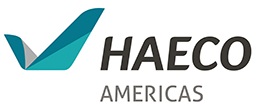 |
 |
Gold Sponsors
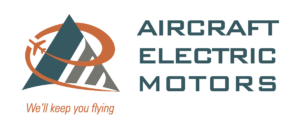 |
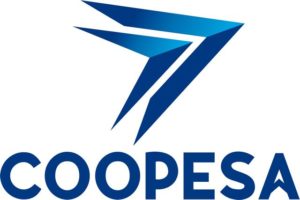 |
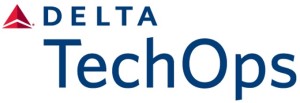 |
Silver Sponsors
Contributors
|
|
Exhibitors
ARSA Works
ARSA Gets More Time on New Maintenance “Profession” Guidance
On March 29, ARSA requested an extension of the April 4 comment deadline for draft Advisory Circular (AC) 65-30B, “Overview of the Aviation Maintenance Profession.” In response, the FAA provided an additional 30 days – which would make the new deadline a Saturday, so comments are now due on Monday, May 6 (a two-day bonus provided by the luck of the calendar).
In 2014, the agency had released a previous draft of the AC for comment. ARSA and the Aviation Technician Education Council (ATEC) responded with a completely rewritten version that reflected the industry’s evolution since the 2001 publication of AC 65-30A (see December 2014 update at arsa.org/ac-65-30). After waiting nearly five years to continue the process, the aviation community can make good on the continuing effort.
“Now that an updated draft has been re-released for comment, it is critical that time be provided to carefully consider this version against not only the agency’s previous effort but also the industry’s,” the association’s extension request said. “ARSA intends to review the current draft and include association members and industry partners in its feedback. Considering how central workforce development planning has become to maintaining the current and future health of the aviation community, more time would allow us to help the FAA produce a cogent and instructive guidance document illustrating the ‘profession.'”
To read the full extension request, click here.
For information on the draft AC, including how to submit comments, click here.
Aviation Maintenance Industry Climbing into Workforce Headwind
The aviation industry is poised for another positive year with global spending on maintenance, repair and overhaul services expected to grow by more than $30 billion over the next decade, according to a new report prepared for ARSA by global consulting firm Oliver Wyman.
The new findings were presented by Oliver Wyman’s CAVOK Vice President, Steve Douglas, at a March 13 event on Capitol Hill in conjunction with ARSA’s 2019 Annual Conference.
Rising incomes and consumer spending are pushing passenger air travel to record levels and fueling the largest year-over-year increase of the in-service aircraft fleet since 2008. With 200 million people entering the middle class worldwide, growth in revenue passenger kilometers (RPK) is anticipated to exceed the annual expansion of gross domestic product (GDP) in most economies over the near term, the Oliver Wyman report said.
Cargo volume is also growing, driven primarily by the recent double-digit expansion of e-commerce sales. Air cargo demand as measured by freight tonne kilometers (FTK, which measures metric tonnes of cargo per kilometer) saw an estimated 3.8 percent increase in 2018, while cargo capacity, measured by available FTK, saw an estimated 4.4 percent increase, after a slight contraction in 2017.
The expansion of business in the commercial aviation industry leads to continued growth in the Maintenance Repair and Overhaul (MRO) market. Total global MRO spend is expected to rise to $116 billion by 2029, up from $81.9 billion in 2019. Aside from the growth in the fleet, the increase will be driven by more expensive maintenance visits and technology enhancements.
According to the report, the U.S. civil aviation maintenance industry employs more than 288,000 technicians and generates $50.4 billion in annual economic activity. The top five states for maintenance industry employment are California (33,196), Texas (24,019), Georgia (22,040), Florida (21,614) and Washington (18,518).
Pressure on wages is expected to escalate as the gap grows between the number of pilots and trained aviation maintenance technicians available and the number required for efficient productivity. Labor and fuel are the industry’s two largest operating expenses, representing almost half of total operating costs. According to the analysis, the industry continues to face a looming shortage of technicians – demand for skilled personnel will outstrip supply by more than nine percent in the second half of the next decade if current trends aren’t reversed.
“Long-term trends for fleet growth are strong and with that, future MRO demand is robust. While the competitive dynamics of the MRO industry continue to evolve, there is still a place in the aftermarket for very well positioned, efficient and cost-effective independent MROs.,” Douglas said in his presentation.
An executive summary of the report and state-by-state breakdown of the industry’s economic impact is available at arsa.org/news-media/economic-data. The full report is available only to ARSA members (copies available via ARSA’s secure online portal in the “Tools for ARSA Members” workspace).
2019 Global Fleet & MRO MarketAssessment by Oliver Wyman CAVOK
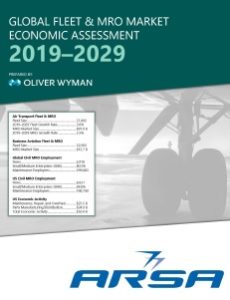 |
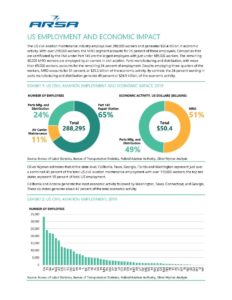 |
Executive Summary: 2019 Global Fleet & MRO Market Assessment
U.S. state by state overview of the 2019 industry employment and economic impact
Oliver Wyman CAVOK is the transportation industry focused technical consulting and services division within Oliver Wyman, a global leader in management consulting and a wholly owned subsidiary of Marsh & McLennan Companies [NYSE: MMC]. For more information, visit cavok.oliverwyman.com.
ARSA Opens Policy Platform with Conference Kickoff
On March 12, a small group of senior aviation maintenance industry professionals participated in a series of collaborative discussions with high-ranking officials from U.S. federal agencies.
The meetings were part of ARSA’s “Executive to Executive Briefings” series where industry leaders have face-to-face discussions with government officials responsible for matters impacting aviation, manufacturing and international commerce. “E2E”, which was first hosted by ARSA in 2018, served as the official kick-off of the association’s 2019 Annual Conference.
Representing multinational corporations, family-owned small businesses, aircraft parts manufacturers, service providers and industry experts, each participant attended on behalf of a conference sponsor. They spent the day crisscrossing the capital city, making stops at the Departments of State, Commerce and Transportation as well as participating in a roundtable discussion with the Federal Aviation Association hosted by the General Aviation Manufacturers Association at its downtown offices. The day concluded with a special briefing by John Taladay, antitrust and competition law practice group chair for global law firm Baker Botts and counsel to the International Air Transportation Association in its landmark competition agreement with engine manufacturer CFM International.
“Putting together a day like this takes a lot of footwork, horse-trading and coordination,” said ARSA Executive Vice President Christian A. Klein, the association’s chief manager for the E2E Briefings. “Seeing it come together is incredibly satisfying and drives home the necessity of personal engagement with the government. Filling a room with the [aviation maintenance] sector’s most-committed leaders and providing them an open platform to interact with American policy leaders is essential to managing the intersection of business and government.”
Klein highlighted a series of specific topics covered throughout the day, including the impacts of politics on safety oversight – particularly related to the U.S. government shutdowns as well as the impending departure of the United Kingdom from the European Union. The multi-national group of industry executives also commented on international market factors and workforce development challenges while providing feedback to the government regarding potential policy mitigations to support industry growth and to protect the global flying public.
“A day of intensive policy discussion is really a great way to begin a [four-day long] industry conference,” Klein concluded. “The work of today’s focused group of professionals will continue to blossom through Friday.”
Having completed its “E2E” day, ARSA will host members for a day of legislative engagement on Wednesday, March 13 before closing out the week with two days of regulatory and business content presented through its traditional Annual Repair Symposium. For conference updates throughout the week, visit arsa.org/conference.
In addition to ARSA’s personnel, the following organizations were represented at the E2E briefings:
AAR Corp
AeroKool Aviation
AeroTEC
Aircraft Electric Motors
Oliver Wyman CAVOK
Component Repair Technologies
COOPESA
First Aviation Services Inc.
Wencor Group
HAECO Americas
HEICO
IAR Technical Services
Lufthansa Technik
MOOG Aircraft Group
The Giles Group
The NORDAM Group, Inc.
Final Documents/Your Two Cents
This list includes Federal Register publications, such as final rules, Advisory Circulars and policy statements, as well as proposed rules and policies of interest to ARSA members.
Legal Brief
Editor’s note: This material is provided as a service to association members for educational and informational purposes only. It does not constitute legal or professional advice and is not privileged or confidential.
Where Are We Now?
By Sarah MacLeod, Executive Director and Brett Levanto, Vice President of Operations
In late 2017, the U.S. Department of Justice released a memorandum describing the agency’s “Prohibition on Improper Guidance Documents.” In January of 2018, the attorney general took another step to prohibit rulemaking by guidance by issuing a memorandum limiting the use of guidance documents in decisions to file lawsuits on behalf of the government.
The DOJ memos prompted ARSA to consider the long-troubling state of guidance in aviation safety against the compliance philosophy’s approach to “deviations from regulatory standards, as defined in the Agency’s safety oversight guidance.” (See the April 2018 Legal Brief “Wouldn’t it be nice?”)
Flash forward to December of last year: The Department of Transportation issued its own memorandum describing its “Review and Clearance of Guidance Documents.” In the DOT document, General Counsel Steven Bradbury described the process and criteria for agency personnel to develop, review and release guidance in a manner that ensures it “remains lawful, reasonable, consistent with Administration policy, understandable, and readily accessible to the public.” (As a modal organization within DOT, the FAA conforms to department-wide standards.)
The memo makes clear a “guidance document…is not intended to have the force or effect of law in its own right…[it] avoids using mandatory language, such as ‘shall,’ must,’ ‘required,’ or ‘requirement,’ unless the language is describing an established statutory or regulatory requirement or is addressed to DOT staff and will not foreclose the Department’s consideration of positions advanced by affected private parties.”
This principle is fundamental to regulatory implementation for executive branch agencies and supportive of compliance by the public. The concept is expressed government-wide in a 2007 bulletin issued by the Office of Management and Budget on “Agency Good Guidance Practices,” which is cited by both the DOJ and DOT memos. In fact, the prohibition against certain words that could imply legal obligation is almost verbatim from the bulletin.
“Guidance documents, used properly, can channel the discretion of agency employees, increase efficiency and enhance fairness by providing the public clear notice of the line between permissible and impermissible conduct while ensuring equal treatment of similarly situated parties,” the OMB bulletin said. “Experience has shown, however, that guidance documents also may be poorly designed or improperly implemented.”
ARSA participated in the development of the OMB bulletin, submitting comments on the draft version circulated for public consideration. The association praised the effort, then provided aviation-specific examples of exactly the kind of bad experience it sought to avoid. The association highlighted multiple examples of agency “rulemaking through guidance” and offered a series of factors for agencies to consider that limit that practice.
More than a decade has passed since OMB’s effort. Where are we now? Guidance documents still include “obligatory” language and are often interpreted as such by both inspectors and certificate holders. The Compliance Philosophy, which has now bureaucratically matured in a “program,” still refers to “safety oversight guidance” as defining regulatory standards for the sake of compliance.
The OMB-recommended reminder indicating guidance “is not mandatory and does not constitute a regulation,” does not absolve the industry from its duty to hold the government to that limitation. DOT’s memo provides a reference for ARSA to hold headquarters accountable, but that effort must be supported by industry asking inspectors what the rule says and reminding everyone that is where compliance starts and ends.
ARSA on the Hill
Making Workforce Progress Under Added Aviation Scrutiny
By Christian A. Klein, Executive Vice President
It’s been an unusually busy month on Capitol Hill. In the wake of a very successful Legislative Day (in conjunction with the ARSA Annual Conference), the association has ramped up its lobbying to secure funding for the new aviation technician grant program. Aircraft certification and safety has sucked up a lot of the aviation policy oxygen in recent weeks, but there’s still been progress on at least one piece of aviation legislation important to ARSA members.
Here’s a quick run-down:
ARSA Legislative Day Puts Maintenance Industry in the Spotlight
Repair station executives stormed Capitol Hill on March 13 as part of the association’s 2019 Annual Conference. The event, which was attended by 50 ARSA members from around the country, kicked off with a briefing by ARSA staff and Government Affairs Chairman Josh Krotec (First Aviation). The group then headed to Capitol Hill.
First up on the agenda was a meeting with the House Aviation Subcommittee staff in the House Transportation & Infrastructure (T&I) Committee’s subcommittee hearing room. The briefing was followed by the presentation of the association’s 2019 Legislative Leadership Awards by ARSA President David Latimer (HAECO Americas) to Reps. Sam Graves (R-Mo.) and Dan Lipinski (D-Ill.). The two received the award in recognition of the leadership role they played in getting the new grant program into last year’s FAA bill. The Legislative Day luncheon in Dirksen Senate Office Building featured Oliver Wyman CAVOK’s Steve Douglas, who unveiled new economic data about the maintenance industry’s economic footprint and outlook.
Throughout the day, ARSA members staff participated in dozens of meetings with members of Congress and congressional staff to raise the industry’s visibility and advance ARSA’s 2019 Legislative Agenda.
Funding for the New Aviation Maintenance Workforce Program
Workforce issues were front and center during the Hill meetings. ARSA’s signature legislative achievement of 2018 was getting language into the FAA bill creating a new $5 million per year grant program to support maintenance workforce development. With the program authorized, our top priority now is getting money appropriated.
| Tell Congress to Make Aviation Workforce a Priority ARSA’s signature legislative victory in 2018 was convincing Congress to create a new grant program help repair stations recruit and train aviation maintenance technicians. Our priority now is getting the program funded … and we need your help. ARSA has completely revamped our grant program action center to help you learn more about the issue and urge your members of Congress to appropriate the money we need. It’s quick and easy. Take a second now the tell your elected represents to make aviation workforce a priority! |
The message about the need to fund the grant program delivered by ARSA members clearly resonated. More than 50 members of Congress have already signed on to letters being coordinated by Reps. Graves and Lipinski and Sens. Jim Inhofe (R-Okla.) and Maria Cantwell (D-Wash.) to House and Senate appropriations leaders in support of funding. The coalition ARSA built last year around the program has also grown to more than 40 organizations, including several interested in a similar program for pilot education that was also included in the FAA bill.
ARSA is once again coordinating coalition lobbying activities. As part of that effort, we’ve updated our action center and strongly encourage all members to weigh in with their representatives and senators to ensured money for technician workforce development is included in this year’s appropriations bills. All the information you need to get active can be found at arsa.org/legislative/grant-program-action-center. It’s quick, simple and will be big boost to our efforts.
No More FAA Shutdowns?
Another ARSA priority is preventing disruptions to the industry in the event of another government shutdown. Many ARSA members complained that the furlough of FAA inspectors earlier this year had negative consequences for their companies and customers (to read ARSA’s statement to Congress, click here). House T&I Chairman Peter DeFazio has proposed legislation that would insulate the agency and allow it to draw from other resources in the event of another appropriations lapse. The bill passed the T&I Committee March 27, but the outlook for the legislation is uncertain given concerns by some members of Congress the bill would give appropriators less control of FAA’s funding.
|
Want to Learn More About ARSA PAC? ARSA’s Political Action Committee helps elect congressional candidates who share ARSA’s commitment to better regulation and a strong aviation maintenance sector. In this critical election year, ARSA PAC has never been more important. But ARSA is prohibited from sending PAC information to members who haven’t opted in to receive it. Please take a second to give us prior approval to talk to you about ARSA PAC. Doing so in no way obligates you to support PAC. It just opens the lines of communication. Click here to give ARSA your consent today. |
Boeing Scrutiny Takes Center Stage
Recent attention on the Boeing 737 Max series aircraft has upended the aviation policy conversation on Capitol Hill and drawn intense scrutiny from House T&I and Senate Commerce, Science and Transportation Committee leaders. The Senate Aviation Subcommittee convened a March 27 hearing at which the chairman of the National Transportation Safety Board, the Department of Transportation’s inspector general, and the FAA’s acting administrator were called to testify. The House T&I Committee sent a request to Boeing for relevant documents to further the committee’s investigation, called for an investigation of foreign pilot training, called for an independent investigation of FAA’s certification process and fixes proposed by Boeing and asked DOT IG to investigate the certification of the Max 8.
The full scope of the political fallout isn’t yet known, but we expect continued intense scrutiny of the FAA and Boeing, with a focus on the agency’s certification procedures and delegation policies.
ARSA is working hard to represent the interests of the entire maintenance industry on Capitol Hill, but given the association’s limited resources, our success depends on member involvement. Thanks everyone who attended Legislative Day and thanks advance to everyone who will use our action center to weigh in with Congress on grant program funding. Together we’ve accomplished great things. Let’s keep up the momentum.
Maintenance Industry Honors Graves, Lipinski for Aviation Workforce Leadership
On March 13, the aviation maintenance industry honored U.S. Reps. Sam Graves (R-Mo.) and Dan Lipinski (D-Ill.) for addressing the chronic shortage of technicians threating to undermine the growth and vitality of America’s aerospace sector.
Last year, Graves and Lipinski were lead sponsors of H.R. 5701, which created a new federal grant program to help recruit and educate aviation technicians. The legislation was ultimately enacted as Sec. 625 in the Federal Aviation Administration (FAA) reauthorization law signed by President Trump in October 2018.
In presenting the Aeronautical Repair Station Association’s 2019 Legislative Leadership Award, the association’s President David Latimer, senior vice president of regulatory compliance for HAECO Americas, stated that the program demonstrates how good people collaborate to address pressing needs regardless of party affiliation and despite any evidence of ideological difference – a fact ARSA’s team observed in its industry-wide coalition building supporting the grant program.
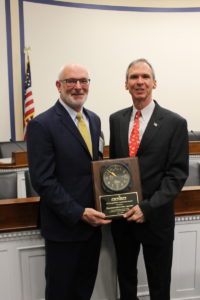
Art Smith, AAR Corp vice president and chief quality officer, congratulates U.S. Rep. Dan Lipinski (D-Ill.) on his earning ARSA’s 2019 Legislative Leadership Award. Click to enlarge.
“Those of us who don’t live and work in D.C. hear a lot about the acrimonious atmosphere on Capitol Hill,” Latimer said. “Whichever news you watch, you’d be forgiven for thinking Democrats and Republicans never speak to each other and are too busy throwing slings and arrows across the aisle to work together.
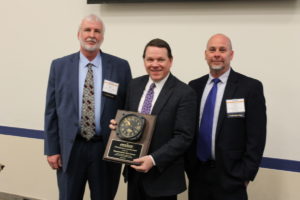
CD Aviation Services Billy Cupps, director of quality assurance, and John Gilmore, quality engineer, post with U.S. Rep. Sam Graves (R-Mo.) after his acceptance of ARSA’s 2019 Legislative Leadership Award.
“Our two honorees are evidence that this simply isn’t true. It’s a significant statement and recognition of bipartisan cooperation that this is the first ARSA Legislative Leadership Award ever simultaneously presented to two members of Congress.”
ARSA members have identified the technician shortage as one of the top strategic challenges facing the aviation maintenance industry. The new program is designed to facilitate collaboration among businesses, labor organizations, schools and government to address the challenge. In a recent letter to Transportation Secretary Elain Chao and Office of Management and Budget Director Mick Mulvaney, 40 aviation organizations called on the administration to request full funding for the technician program and a related a pilot education program in the president’s proposed FY 2020 budget.
The award presentation took place in conjunction with ARSA’s Legislative Day – a component of the association’s Annual Conference. More than four dozen executives from leading aviation maintenance companies met with lawmakers to urge Congress to appropriate the funds needed for the Department of Transportation to initiate the grant program.
Keep up to date on ARSA’s Annual Conference, which runs through March 15, at arsa.org/conference.
Regulatory Update
FAA Updates Industry on AVS Strategy and Brexit
On March 22, ARSA’s Managing Director & General Counsel Marshall Filler attended two FAA briefings of industry stakeholders hosted by the General Aviation Manufacturer’s Association.
The first, from Associate Administrator for Aviation Safety Ali Bahrami, focused on the draft AVS Strategic Plan for FY 2020 through 2024.This is a high-level document focused on the agency’s vision, goals, strategic themes, initiatives and activities. There are several overarching goals (improving safety, infrastructure, innovation and accountability) and metrics for evaluating AVS’s performance. Industry’s comments were welcomed by Bahrami and the draft plan is also being circulated among FAA managers for comment. While the briefing was about the strategic plan, Bahrami acknowledged the challenges facing the FAA in light of the recent groundings of the B-737-8/9 MAX. However, he expressed confidence that the necessary actions to address the root causes would be taken.
The second briefing was given jointly by the FAA and the Civil Aviation Authority of the United Kingdom (which attended remotely) and focused on Brexit. In ARSA’s opinion, the regulatory authorities have done an excellent job to minimize the potential disruptions that could result from a “hard” or no-deal Brexit. The number of hours spent by the UK, European Union and foreign governments to ensure that impacts on the aerospace (and other) sectors are substantially mitigated is worthy of note. The bottom line is that no one knows how this will play out and so the governments have had to hope for the best while planning for the worst.
The UK government has announced its intention to adopt EASA safety regulations as its own, thus greatly facilitating the transition to UK oversight and widespread acceptance of UK aviation approvals. The United States, Canada, Brazil and many other authorities have agreements in place with the UK CAA that will ensure that UK-based approved maintenance organizations will remain certificated even in a no-deal withdrawal from the EU. Similarly, the UK CAA will recognize EASA Part 145 approvals in the U.S. and other countries for at least for two years while the details of future collaboration among the affected governments are worked out.
Stay tuned as ARSA continues to monitor Brexit-related issues and to support AVS in development of its strategic plan.
To see the agency’s presentation materials from the event, click here.
To see the association’s update regarding details of the UK-U.S. MIP, as posted by the UK CAA on March 14, visit arsa.org/brexit.
New Cross-Reference Matrices for Compliance with U.S./UK MAG
For updates, resources and references related to Brexit negotiations, bookmark ARSA’s issue page, which can be found at arsa.org/regulatory/easa/brexit.
Brexit
From the UK CAA – U.S. MIP Signed
UPDATE: On March 26, Transport Canada and the Civil Aviation Authority of the United Kingdom signed the English version of the “Hard-Brexit Scenario” for the working agreement. The agreements have been posted on the UK CAA website and can be found by clicking here.
On March 14, the Civil Aviation Authority of the United Kingdom posted details of new implementing procedures agreed to under the bilateral aviation safety agreement (BASA) between the UK and the United States.
“The agreements ensure that the level of cooperation between the two authorities and their systems will remain the same if the UK leaves the European Union without a negotiated exit in place,” the CAA noted in its release. Since the UK and EU continue to negotiate the terms of “Brexit,” and with delays in the separation date from late March to April 2019, the FAA has so far withheld publication of the agreement.
UK signs post-EU exit air safety agreements with USA
Details of new implementing procedures agreed under the bilateral air safety agreements (BASA) between the UK and US were today discussed with aerospace and aviation industry representatives at an event at the Embassy of the United States in London. Click here to read more.
Training
HELI-EXPO 2019: Catch Up on ARSA, OFM&K Presentations
From March 4-5, ARSA’s great regulatory minds were at HAI HELI-EXPO 2019 in Atlanta, Georgia.
Marshall S. Filler and Sarah MacLeod, the association’s foremost experts in regulatory compliance (and managing members of the firm of Obadal, Filler, MacLeod & Klein, P.L.C.) lead a pair of professional education courses as well as three “Rotor Safety Challenge” presentations.
Whether you were able to participate in Atlanta or not, much of the material presented by MacLeod and Filler at HELI-EXPO is available through ARSA’s online training program. To review the library of available courses and register for immediate access to on-demand sessions, click here. You also may review the session information below for links to related classes.
Public Aircraft
This course provides instruction on the statutory provisions and FAA guidance governing public aircraft operations. It covers the basic requirements for an aircraft to be operated as a public aircraft, what constitutes an eligible governmental function, and the practical implications of using the same aircraft to conduct both civil and public operations. It also discusses the FAA policy regarding operations conducted under contract for a government entity.
Click here to see ARSA’s package of public aircraft sessions.
Regulatory Comprehension for Maintenance
This course covers the FAA’s authority, process for promulgating rules, and organization, then walks through the general requirements in Title 14 of the Code of Federal Regulations to explain how its various components are linked together in a “regulatory chain” that must be comprehended by aviation businesses.
Click here to see ARSA’s “soup to nuts” session on part 145.
[2018 Course] Drug & Alcohol Testing Programs: Regulatory Basics to Business Needs
This course reviews the drug and alcohol testing requirements in Titles 14 and 49 of the Code of Federal Regulations (CFRs). It will also provide guidance on setting up these programs, including instruction on how safety sensitive functions are defined, as well as information about avoiding many common testing program mistakes that can subject companies to enforcement action.
Click here to see the ARSA Training series on D&A Testing Programs
Building a Professional Relationship with the Government
This session provides a road map for building a positive relationship with civil aviation authorities. It begins by describing the rules that should always be considered when engaging with aviation safety regulators, then provides instruction on how to introduce your company and maintain consistent contact — not just when there’s a problem. The session concludes by providing strategies for maintaining a professional relationship with regulators.
Click here to see ARSA’s multiple bundles of sessions related to government agencies and engagement.
Best Practices in Maintenance Recordkeeping
This session explores the regulatory responsibilities of creating and maintaining maintenance records. It will help participants to define:
- Regulatory responsibilities of the operator versus the maintenance provider in creating and maintaining maintenance records
- How obligations can be shifted by contract but not under aviation safety regulations
- Maintenance recordkeeping regulations, the documents essential to making airworthiness determinations.
Click here to see ARSA’s session on recordkeeping for mechanics.
Self Disclosure – Avoiding Self Exposure
This session reviews the elements of the FAA’s self-disclosure programs and provides methods for addressing non-compliance with creating unnecessary scrutiny.
Click here to see ARSA’s self-disclosure training sessions.
Part 145 in Three Parts
Join Executive Director Sarah MacLeod for a three-session training series covering part 145. Make sure you know what the regulation governing repair stations really says about your business.
Part 145 – The Business End
Real world implications of aviation safety requirements.
Click here to register and get access for 90 days.
Part 145 – Get Your House In Order
Housing, facility and equipment requirements in aviation safety regulations.
Click here to register and get access for 90 days.
Part 145 – Friends in Certificated Places*
Maintenance personnel requirements in aviation safety regulations.
Click here to register and get access for 90 days.
*The slides included in this session’s materials PDF have been corrected to update the description of repairman certificate eligibility on slides 18 and 20. Please ensure you are accessing the most recent version when utilizing these materials. Registration for an ARSA-provided training session includes:
- Unlimited access for 90 days to the recording made available after the live session is complete.
- A copy of the presentation and all reference material with links to relevant resources and citations.
- A certificate upon completion of the class, as well as any test material.
The association’s training program is provided through Obadal, Filler, MacLeod & Klein, P.L.C., the firm that manages ARSA. To go directly to OFM&K’s online training portal, visit PotomacLaw.inreachce.com. To learn more about the association’s training program and see course availability, visit arsa.org/training.

Regulatory Compliance Training
Test your knowledge of 14 CFR § 65.95 – Inspection authorization privileges and limitations.
Click here to download the training sheet.
Membership
Going Big with a Mini Display of ARSA Pride
From March 20-22, ARSA Regular Member AeroKool Aviation Corporation– which has become an exemplar of proactive membership as a Platinum Sponsor of the 2019 Annual Conference – carried the association along on its participation in SkyWest Airlines annual Mini Indy races.
“Mini Indy brings together teams from international and local businesses, community leaders and various civic groups to race miniature Indy-style cars through a twisting course,” the event website explains. “Funds raised from this event help support the United Way Dixie. The organization helps hundreds of local people every day by funding non-profit, tax-exempt charitable organizations.”
A regular participant in the event, AeroKool contacted ARSA asking permission to include the association’s logo on this year’s car. Placed right next to the company’s name on either side of the driver’s seat, the association’s logo demonstrates commitment to good safety and commonsense regular compliance as part of AeroKool’s dedication to positive action in the community.
“This event is a fun way to do some good for others,” said Jon Silva, AeroKool president. “It’s great to get out of the facility, ‘compete’ alongside industry colleagues and raise money for a worthy cause. After all that ARSA has done for us, it just made sense to celebrate our membership at the same time.”
The association will support almost any request to brandish its branding, and most opportunities don’t require a race car (AeroKool also notes its membership on the “Certifications & Approvals” page of its website…that’s an easy place to start). Contact Brett Levanto (brett.levanto@arsa.org) for help or go straight to arsa.org/membership/show-your-colors.
To see more about the Mini Indy event, visit www.miniindy.org.
To learn about AeroKool, visit www.aerokool.com.
Global Good Sense Recognized by First-Ever Joint Weston Award
On March 15, ARSA gave its 2019 Leo Weston Award to two exceptional individuals from member companies. Werner Luehmann, head of regulatory compliance and authorities’ liaison at Lufthansa Technik and also Howard Whyte, quality fellow in regulatory compliance and aftermarket services for Collins Aerospace. The association presented the award jointly for the first time in order to recognize the career accomplishments of these international industry professionals – an American and a German. Each represent the commitment to safety and practical business sense needed for long-term success in the global aviation maintenance industry.
Luehmann served in the German Air Force before earning his degree in aeronautical engineering from Brunswick Technical University. He entered civilian service in 1981 as a design engineer for Messerschmitt-Bölkow-Blohm. In 1985, Luehmann joined Lufthansa German Airlines, Hamburg and moved to the quality management department at Lufthansa Technik in 1989. He has long been a fixture at ARSA events and has participated regularly in the association’s broad engagement with both American and European regulators.
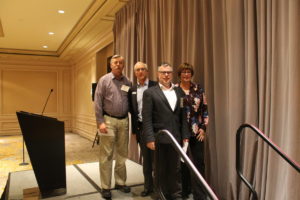
2019 Leo Weston Award Honorees Howard Whyte (Left) and Werner Luehmann (Center Front) post with Marshall Filler and Sarah MacLeod during ARSA’s 2019 Member Meeting.
Whyte began his career as an airline mechanic, making stops at Pan Am, TWA and Presidential Airways. In 1996 he transitioned to the repair station environment, becoming quality assurance manager for Sermatech International’s Mid-Atlantic facility. He has worked for Collins Aerospace as well as its predecessor companies since the late 2000s. In his biography for ARSA’s 2006 Annual Repair Symposium, during which he provided human factors training, notes his hobbies including “tilting at windmills and full-contact gardening.” His good humor – a necessary trait in a regulatory environment – and dedication to ARSA’s work have long been valued by the association’s team.
“It’s great to celebrate both Werner and Howard this week,” said ARSA Executive Director Sarah MacLeod. “Not only are they wonderful people – I
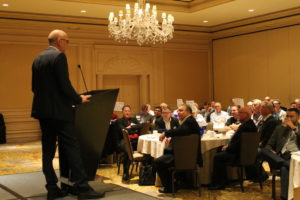
Lufthansa Technik’s Michael Boegle speaks about the company’s own celebration of Werner Luehmann’s career during ARSA’s 2019 Member Meeting.
mean, Howard somehow got his professional title to be ‘quality fellow,’ which is a good description – they also are steadfast advocates or reasonable regulatory interpretation and practical quality oversight. Giving them both the Weston Award means celebrating the good sense of two professionals while recognizing the international network that supports aviation safety worldwide.”
The Weston Award is celebrated regularly as part of ARSA’s Annual Conference. It was first bestowed on Leo Weston himself
and honors individuals who embody his commitment to the business of aviation safety. As an FAA official, Weston was influential in the association’s founding by advocating for the creation of an organization to represent the interests of maintenance providers. He remained an inspiration to the association and its members across his long career dedicated to the public good.
Luehmann and Whyte are the 12th and 13th professionals recognized by ARSA as part of Weston’s legacy.
Check in on what happened during the four days of the 2019 Annual Conference by visiting arsa.org/conference.
Ignore Brett…and Fraudulent Emails
Accidental Distribution of Lapsed Member Message
On March 4, a membership campaign message from ARSA VP of Operations Brett Levanto was blasted to all association contacts. The email, which provides assistance to contacts whose memberships have lapsed, was supposed to go to a single organization, but was sent to a much broader list.
So, on just this one occasion, contacts receiving an email from Brett (brett.levanto@arsa.org) are allowed to ignore it. This is a special occasion, as the ARSA team of course is careful regarding the delivery of messages and hopes you will provide necessary attention to anything else that comes from an @arsa.org or related domain.
From now on, keep your membership current and you’ll never have to see a message like that from Brett (or anyone else on the ARSA team) again.
If you’re curious about the status of your ARSA membership, login to the association’s secure online portal at: https://arsa.member365.com.
Fraudulent Email Raising Funds for Sick Child
Multiple ARSA members have reported receipt of a suspicious email claiming to be from an @arsa.org email address and raising money for a sick child. There is evidence that similar messages have been sent claiming to be from other aviation trade associations.
ARSA did not send such a message and does not raise funds for matters not related to the aviation industry. If you received one, please delete it immediately. Contact your IT department or financial institution for assistance if you did participate in the fraudulent fundraiser.
In general, ARSA communications always provide clear instruction/reference regarding any action that should be taken by the recipient, e.g., clicking a link, visiting a website or downloading a file. If you ever have a question about an association message, or doubt the authenticity of something you’ve received, contact Brett Levanto (brett.levanto@arsa.org or 703.739.9543 Ext. 103) for help.
An Approved Word from Our Newsletter Sponsors
From time to time, ARSA provides a mechanism for sponsors of its Dispatch and hotline newsletters to reach readers directly through sponsored “blast” emails. Allowing this advertising option gives companies a chance to directly show their support of the association and provide useful information and resources to readers.
While receiving this message, ARSA subscribers and members should be assured that:
(1) The frequency of special “blast” messages is kept to a minimum. This maintains the special focus provided to advertisers sending the messages and prevents “overload” in readers’ inboxes.
(2) Advertisers are not provided direct access to newsletter subscription lists. Messages are constructed and distributed through ARSA’s partner Multiview, which oversees its periodicals.
(3) ARSA team members review and approve all messages prior to distribution.
For questions about ARSA’s advertising options, including ways to stand up for the association through your company’s support, contact Vice President of Communications Brett Levanto (brett.levanto@arsa.org).
A Reminder: Don’t Let Technology Keep You From ARSA
Thanks to spam filters, firewalls and quarantines, it can sometimes be difficult for organizations like ARSA to get messages into your inbox. To ensure you have access to every newsletter, alert and update, ensure that the following domains are on your “safe list”:
@arsa.org
@potomac-law.com
@multibriefs.com
To know what to look for:
Weekly: The Dispatch newsletter is distributed every Wednesday.
Monthly: The hotline newsletter is distributed the first week of each month.
Various: Member alerts are distributed as necessary – usually the association sends two or three each month.
To learn more about ARSA’s communications efforts – including how to advertise – visit arsa.org/news-media. For assistance with technical issues, consult your organization’s IT department/assistant as necessary.
Welcome & Welcome Back – New & Renewing Members
ARSA’s members give the association life – its work on behalf of the maintenance community depends on the commitment of these organizations. Here’s to the companies that joined or renewed in March:
New Members (Member Category)
Aery Aviation, LLC, Assoc
Ronald Cannoles, Affil
24Jets dba Alirio Aircraft Services, Inc., R01
Renewing Members (Member Category, Member Since)
Accurate Accessories, LLC, R01, 2002
AERO Component Repair, LLC, R01, 2011
Asko Processing, Inc., R04, 1996
Avborne Accessory Group, Inc.-dba Avborne Component Solutions, R04, 2013
Aviation Propellers, Inc., R02, 2011
Aviation Safety Products, Inc., R01, 2013
Barfield, Inc., R05, 1995
Cargo Systems, Inc., R01, 1999
Harman’s Repair Station, Inc., R01, 2012
IAR Technical Services LLC, R03, 2017
Mingo Aerospace, LLC, R03, 2005
Nelson Engineering Co., R02, 2013
Ohlinger Industries, Inc., R04, 2006
SONICO, Inc., R03, 1995
Quick Question – Ready for 2020 (Conference Planning)
In Washington, D.C., planning for 2020 is typically focused on the next presidential and congressional elections. Though ARSA’s legislative team is busy actually getting things done on Capitol Hill before all thoughts turn to politics, the association is focused on preparing for the 2020 Annual Conference (mark your calendars for March 10-13).
Help with that planning – and make next year’s event as valuable as possible for all participants – by sharing your thoughts through this month’s “quick question.” Whether you were there this year or not, ARSA wants to hear from you.
Note: The question is displayed in its own, embedded window. If the “Submit” button is not visible on the screen, you must scroll within the survey window in order to submit your response.
If the embedded survey does not appear/load, open the survey independently by visiting: www.surveymonkey.com/r/qq-conference.
Click here to see what questions have been asked and answered…and keep a lookout for more.
For more information about this or any other question, contact Brett Levanto (brett.levanto@arsa.org).
A Member Asked…Additive Manufacturing
Note: This “member asked” was submitted via the pre-conference “quick question” soliciting interest for Sarah MacLeod and Marshall Filler’s “Opening Salvo” session with international regulators.
Q: Recently an FAA inspector stated that the agency guidance required repair stations fabricating parts by additive manufacturing to have a “specialized service” rating to perform that work. That did not sound correct, is it?
A: The agency did issue guidance to its inspectors through Order 8900.1 along with a “Job Aid” for evaluating additive manufacturing at repair stations. The guidance mistakenly indicated that a limited rating for specialized service could (actually, it indicated that it should) be issued for additive manufacturing. As soon as the association learned of the attempt to provide a maintenance rating for manufacturing, it requested the agency rescind the misdirected “order.” The agency did so on by placing this notice at the top of its Flight Standards Information Management System website:
Additive Manufacturing Policy: Aircraft Maintenance Division AFS-300 is revising Additive Manufacturing policy and guidance contained in FAA Order 8900.1, Volume 6, Chapter 11, Section 29. Please do not use any previous or printed versions of this original policy.
While the “Job Aid” is still in evidence, it does focus on basic elements needed to ensure the fabrication meets the “design” elements. In other words, if a maintenance provider is fabricating using additive manufacturing techniques, the quality system must ensure the part is made correctly.
The association is in contact with the FAA’s Aircraft Certification Service to ensure that any and all guidance associated with additive manufacturing is consistent among and between design, production and maintenance. Fabrication is definitely not controlled by part 43 – it is controlled by part 21, specifically, section 21.9 and for repair stations, it is section 21.9(a)(5) or if done in accordance with an owner or operator’s instructions section 21.9(a)(6).
The bottom line is that maintenance does not include fabrication—therefore, you cannot provide a “rating” for performing manufacturing under part 145. The association believes Flight Standards Service now understands that fact, which is why the “guidance” was removed and will be coordinated with Aircraft Certification Service.
Member questions should be submitted through the inquiry system run through ARSA’s new online member portal. Members can use their portal access to submit inquiries by logging in through arsa.member365.com/sharingnetwork.
Make ARSA’s Voice Your Own: Advertise
ARSA has a menu of advertising opportunities for arsa.org, the hotline and the ARSA Dispatch. Take advantage of these great opportunities today to showcase your company, a new product or event. For more information go to arsa.org/advertise.
Stand Up for ARSA by Sponsoring
In order to provide world-class resources for its members, the association depends on the commitment of the aviation community. By sponsoring events and activities, supporters can help ARSA’s work on behalf of repair stations to endure.
Need a place to start? For information about opportunities, contact Vice President of Operations Brett Levanto (brett.levanto@arsa.org).
Resources
ARSA strives to provide resources to educate the general public about the work of the association’s member organizations; should you need to provide a quick reference or introductory overview to the global MRO industry, please utilize AVMRO.ARSA.org.
ICA Issue Page
Since its inception, ARSA has worked to ensure that basic safety information (i.e., Instructions for Continued Airworthiness [ICA], including component maintenance manuals [CMM]) is made available at a fair and reasonable price to operators, maintenance providers, and any other person required by 14 CFR to comply with those instructions. ICA Issue Page
Brexit Resource Page
On June 23, 2016, citizens of the United Kingdom voted to withdraw from the European Union in a national referendum. As the process of making that withdrawal happen drags on. This page is provided as a resource for the aviation maintenance community regarding the transition. Brexit Resource Page (Updated)
Careers In Aviation Maintenance
Every year, more people are flying. The expansion of the global middle class and improvements in technology have opened aviation markets – for passengers and cargo – to a broader public than ever before. As the the flying public gets larger, more men and women are desperately needed to keep the world safely in flight.
Quick Question Portal
See what ARSA has asked and what’s been answered and participate in the conversation about what’s going on in the aviation maintenance world.
AVMRO Industry Roundup
ARSA monitors media coverage on aviation maintenance to spread the word about the valuable role repair stations play globally by providing jobs and economic opportunities and in civic engagement. These are some of this month’s top stories highlighting the industry’s contributions. You can explore these stories through ARSA’s Dispatch news portal.
Industry Calendar
2019 Asia-Pacific Bilateral Partners Dialogue Meeting – Queenstown, New Zealand – April 16-18, 2019
MRO BEER – Vilnius, Lithuania – May 21-22, 2019
the hotline is the monthly publication of the Aeronautical Repair Station Association (ARSA), the not-for-profit international trade association for certificated repair stations. It is for the exclusive use of ARSA members and federal employees on the ARSA mailing list. For a membership application, please call 703.739.9543 or visit arsa.org/membership/join. For information about previous editions, submit a request through arsa.org/contact. This material is provided for educational and informational purposes only. It does not constitute legal, consulting, tax or any other type of professional advice. Law, regulations, guidance and government policies change frequently. While ARSA updates this material, we do not guarantee its accuracy. In addition, the application of this material to a particular situation is always dependent on the facts and circumstances involved. The use of this material is therefore at your own risk. All content in the hotline, except where indicated otherwise, is the property of ARSA. This content may not be reproduced, distributed or displayed, nor may derivatives or presentations be created from it in whole or in part, in any manner without the prior written consent of ARSA. ARSA grants its members a non-exclusive license to reproduce the content of the hotline. Employees of member organizations are the only parties authorized to receive a duplicate of the hotline. ARSA reserves all remaining rights and will use any means necessary to protect its intellectual property.
© 2019 Aeronautical Repair Station Association





